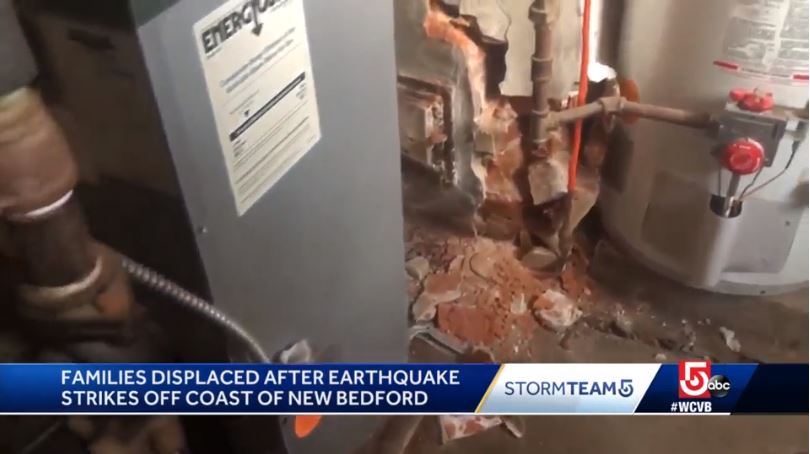

After a tremor measuring 3.6 on the Richter Scale emanated about seven miles off the coast of Dartmouth, MA, Sunday morning and shook the ground as far away as New Hampshire and New York, we’re hearing that question quite often. So let’s get right to the answer.
No. Standard homeowners and commercial property policies typically do not cover damage directly caused by earthquakes, though they do cover some secondary damage resulting from earthquakes. If your property catches fire resulting from a gas line ruptured by an earthquake, for example, you’re covered. But protecting against damage directly resulting from an earthquake requires additional coverage known as an endorsement, or rider, in your home or business property policy. You can also purchase earthquake insurance as a separate policy.
Sunday’s earthquake displaced 10 New Bedford families totaling 22 people, the Red Cross told Boston TV station WCVB5. Damage to the victims’ homes included collapsed chimneys, ruptured gas lines and carbon monoxide emissions resulting from the damage. Because standard homeowners and renters policies exclude claims directly resulting from earthquakes, it appears the damage to the displaced families’ homes would not be covered unless the insured’s policy includes an earthquake rider.
This begs another question:
What does earthquake insurance cover?
Earthquake insurance covers:
- damage to your residence (referred to as the “dwelling” in homeowners insurance policies) or commercial structure
- damage to personal belongings inside the structure
- additional living expenses (ALE) or loss of use — the expenses you would incur from having to live someplace else or relocate your business.
Value Penguin provides a good explanation of how earthquake insurance and claims work here.
Next question:
Do I need earthquake insurance?
Minor earthquakes in New England are more common than many people realize. John Ebel, the senior research scientist at the Boston College’s Weston Observatory, told WCVB 5 that earthquakes similar to Sunday’s occur about once a year in New England. And while Sunday’s quake off Massachusetts’ SouthCoast was minor compared to, say, California standards, it was strong enough for people as far away as central New Hampshire and Long Island, New York, to report feeling its effects, according to the U.S. Geological Survey (USGS) website.
The quake was nationally reported by media outlets including CNN and the New York Times.
Property damage appeared concentrated in New Bedford, located east of Dartmouth, where police on Sunday said they had no reports of damage caused by the quake. The same was true in Westport and Fall River, MA, west of Dartmouth: lots of calls to police about a ground-shaking explosion, but none about significant structural damage. Still, local officials recommended vigilance on the part of property owners and renters, advising them to check for damage to chimneys, smokestacks and gas lines, and to monitor carbon monoxide detectors.
Due to significantly different geological conditions, according to the USGS, seismic waves generally travel farther on the East Coast than on the West Coast. This means a 4.5-magnitude earthquake here could feel like and do the damage of a 5.5-magnitude quake there. In an email to the New Bedford Standard-Times on Sunday, the University of Connecticut’s Department of Geosciences said, “Although our area isn’t on the boundary of a tectonic plate, stresses that are communicated far into the interior of our plate can reactivate ancient faults that are hundreds of millions of years old.”
And because earthquakes are far less frequent in New England than in California, the USGS notes, building codes are less stringent on the East Coast than they are out west, generally making property in New England more vulnerable to a 3.6-magnitude quake than comparable real estate would be around Los Angeles or San Francisco.
And that brings us to the type of question inevitable in any discussion of insurance:
How much does earthquake insurance cost?
Depending the age and location of the home, its construction materials and whether your homeowners policy includes an open-peril endorsement, earthquake insurance in New England is relatively inexpensive — 35 cents on average per $1,000 of coverage on the home. Most deductibles are 5 percent of the dwelling coverage amount, though some companies offer a lower-deductible/higher-premium option.
“Inexpensive” is a relative word, but considering the damage an earthquake could do to your home or commercial property, you may determine that earthquake insurance is a bargain.
Broker Val Feeney of our Alera Group partner agency Gordon Atlantic Insurance has a good explanation of how earthquake insurance rates work in this short video.
To learn more about earthquake insurance, contact me.
By MATTHEW BOYLE
Account Executive, Sylvia Group
About Matthew Boyle and Sylvia Group


A licensed insurance producer, Certified Insurance Service Representative (CISR) and Certified Professional in Personal Lines (CPPL), Matthew Boyle is passionate about informing and educating his clients on the coverage they have and the policies they should consider. Whether the need is homeowners insurance, auto insurance, specialized coverage such as coastal property insurance, or a basic Business Owners Policy (BOP), he’s committed to protecting each client with the performance-based insurance program that’s right for them.
Sylvia Group empowers businesses and individuals with performance-based insurance, benefits and financial planning programs. We make our clients active participants in managing risk and containing premiums, resulting in coverage that is both customized and cost-effective. In addition to making a difference for our clients, we make a difference for our community as a whole by actively supporting and serving many of southern New England’s most reputable and effective nonprofit organizations and institutions. At the outset of 2020, Sylvia Group became an Alera Group company, combining the local, personal service for which we’re known with the scope and resources of a national firm.








